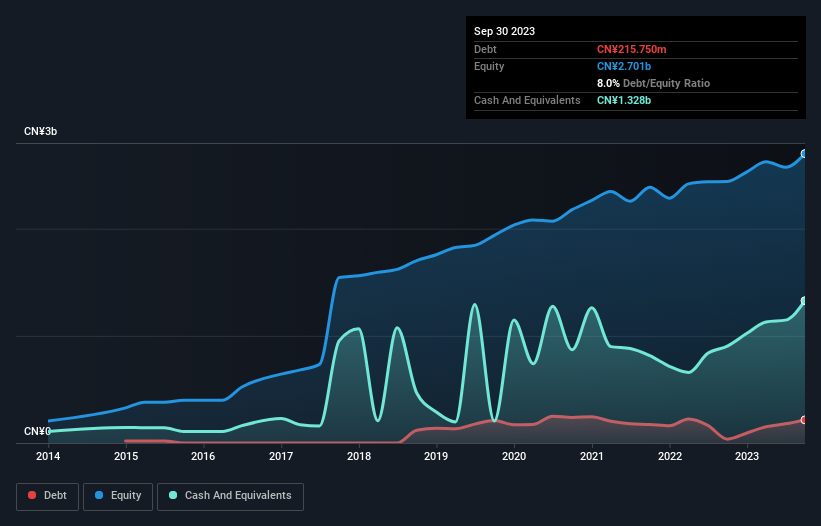Is Yindu Kitchen Equipment (SHSE:603277) Using Too Much Debt?

The external fund manager backed by Berkshire Hathaway's Charlie Munger, Li Lu, makes no bones about it when he says 'The biggest investment risk is not the volatility of prices, but whether you will suffer a permanent loss of capital.' So it seems the smart money knows that debt - which is usually involved in bankruptcies - is a very important factor, when you assess how risky a company is. As with many other companies Yindu Kitchen Equipment Co., Ltd (SHSE:603277) makes use of debt. But the real question is whether this debt is making the company risky.
When Is Debt A Problem?
Debt and other liabilities become risky for a business when it cannot easily fulfill those obligations, either with free cash flow or by raising capital at an attractive price. If things get really bad, the lenders can take control of the business. However, a more common (but still painful) scenario is that it has to raise new equity capital at a low price, thus permanently diluting shareholders. Of course, plenty of companies use debt to fund growth, without any negative consequences. When we think about a company's use of debt, we first look at cash and debt together.
Check out our latest analysis for Yindu Kitchen Equipment
What Is Yindu Kitchen Equipment's Net Debt?
The image below, which you can click on for greater detail, shows that at September 2023 Yindu Kitchen Equipment had debt of CN¥215.8m, up from CN¥35.5m in one year. But it also has CN¥1.33b in cash to offset that, meaning it has CN¥1.11b net cash.

A Look At Yindu Kitchen Equipment's Liabilities
Zooming in on the latest balance sheet data, we can see that Yindu Kitchen Equipment had liabilities of CN¥790.3m due within 12 months and liabilities of CN¥285.4m due beyond that. Offsetting this, it had CN¥1.33b in cash and CN¥291.0m in receivables that were due within 12 months. So it actually has CN¥543.4m more liquid assets than total liabilities.
This short term liquidity is a sign that Yindu Kitchen Equipment could probably pay off its debt with ease, as its balance sheet is far from stretched. Succinctly put, Yindu Kitchen Equipment boasts net cash, so it's fair to say it does not have a heavy debt load!
Yindu Kitchen Equipment's EBIT was pretty flat over the last year, but that shouldn't be an issue given the it doesn't have a lot of debt. When analysing debt levels, the balance sheet is the obvious place to start. But ultimately the future profitability of the business will decide if Yindu Kitchen Equipment can strengthen its balance sheet over time. So if you're focused on the future you can check out this free report showing analyst profit forecasts.
But our final consideration is also important, because a company cannot pay debt with paper profits; it needs cold hard cash. Yindu Kitchen Equipment may have net cash on the balance sheet, but it is still interesting to look at how well the business converts its earnings before interest and tax (EBIT) to free cash flow, because that will influence both its need for, and its capacity to manage debt. Over the most recent three years, Yindu Kitchen Equipment recorded free cash flow worth 67% of its EBIT, which is around normal, given free cash flow excludes interest and tax. This cold hard cash means it can reduce its debt when it wants to.
Summing Up
While we empathize with investors who find debt concerning, you should keep in mind that Yindu Kitchen Equipment has net cash of CN¥1.11b, as well as more liquid assets than liabilities. The cherry on top was that in converted 67% of that EBIT to free cash flow, bringing in CN¥720m. So is Yindu Kitchen Equipment's debt a risk? It doesn't seem so to us. Over time, share prices tend to follow earnings per share, so if you're interested in Yindu Kitchen Equipment, you may well want to click here to check an interactive graph of its earnings per share history.
Of course, if you're the type of investor who prefers buying stocks without the burden of debt, then don't hesitate to discover our exclusive list of net cash growth stocks, today.
New: Manage All Your Stock Portfolios in One Place
We've created the ultimate portfolio companion for stock investors, and it's free.
• Connect an unlimited number of Portfolios and see your total in one currency
• Be alerted to new Warning Signs or Risks via email or mobile
• Track the Fair Value of your stocks
Have feedback on this article? Concerned about the content? Get in touch with us directly. Alternatively, email editorial-team (at) simplywallst.com.
This article by Simply Wall St is general in nature. We provide commentary based on historical data and analyst forecasts only using an unbiased methodology and our articles are not intended to be financial advice. It does not constitute a recommendation to buy or sell any stock, and does not take account of your objectives, or your financial situation. We aim to bring you long-term focused analysis driven by fundamental data. Note that our analysis may not factor in the latest price-sensitive company announcements or qualitative material. Simply Wall St has no position in any stocks mentioned.
About SHSE:603277
Yindu Kitchen Equipment
Engages in the research, development, production, sale, and service of commercial catering equipment in China and Internationally.
Solid track record with excellent balance sheet.


